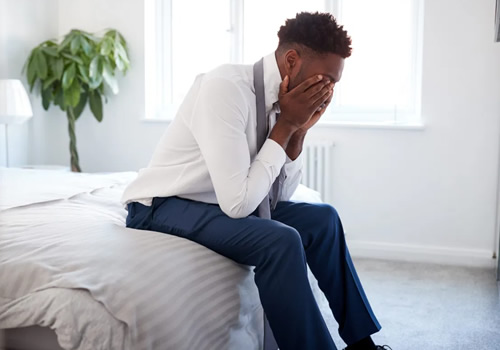With all anxiety comes the perception that we are in some way vulnerable, threatened, or in danger, either physically, mentally, or socially.
Anxiety Disorder-Experiencing occasional anxiety is a normal part of life. However, people with anxiety disorders frequently have intense, excessive, and persistent worry and fear about everyday situations. Often, anxiety disorders involve repeated episodes of sudden feelings of intense anxiety and fear or terror that reach a peak within minutes (panic attacks).
Examples of anxiety disorders- include generalized anxiety disorder, social anxiety disorder (social phobia), specific phobias, and separation anxiety disorder. You can have more than one anxiety disorder. Sometimes anxiety results from a medical condition that needs treatment.
Symptoms- The common ones include feeling nervous, restless, or tense; having a sense of impending danger, panic, or doom; having an increased heart rate; breathing rapidly (hyperventilation); sweating; trembling; feeling weak or tired; trouble concentrating or thinking about anything other than the present worry; having trouble sleeping; experiencing gastrointestinal (GI) problems; having difficulty controlling worry; having the urge to avoid things that trigger anxiety.
Several types of anxiety disorders -These feelings of anxiety and panic interfere with daily activities, are difficult to control, are out of proportion to the actual danger, and can last a long time. You may avoid places or situations to prevent these feelings.
- Agoraphobia - This is a type of anxiety disorder where you fear and often avoid places or situations that might cause you to panic, and make you feel trapped, helpless, or embarrassed.
- Anxiety disorder due to a medical condition - includes symptoms of intense anxiety or panic that are directly caused by a physical health problem.
- Generalized anxiety disorder - includes persistent and excessive anxiety and worry about activities or events- even ordinary, routine issues. The worry is out of proportion to the actual circumstance, is difficult to control, and affects how you feel physically. It often occurs along with other anxiety disorders or depression.
- Panic disorder - involves repeated episodes of sudden feelings of intense anxiety and fear or terror that reach a peak within minutes (panic attacks). You may have feelings of impending doom, shortness of breath, chest pain, or a rapid, fluttering, or pounding heart (heart palpitations). These panic attacks may lead to worrying about them happening again or avoiding situations in which they've occurred.
- Selective mutism - is a consistent failure of children to speak in certain situations, such as school, even when they can speak in other situations, such as at home with close family members. This can interfere with school, work, and social functioning.
- Separation anxiety disorder - is a childhood disorder characterized by anxiety that's excessive for the child's developmental level and related to separation from parents or others who have parental roles.
- Social anxiety disorder (social phobia) - involves high levels of anxiety, fear, and avoidance of social situations due to feelings of embarrassment, self-consciousness, and concern about being judged or viewed negatively by others.
- Specific phobias - are characterized by major anxiety when you're exposed to a specific object or situation and a desire to avoid it. Phobias provoke panic attacks in some people.
- Substance-induced anxiety disorder - is characterized by symptoms of intense anxiety or panic that are a direct result of misusing drugs, taking medications, being exposed to a toxic substance, or withdrawal from drugs.
- Other specified anxiety disorder and unspecified anxiety disorder - are terms for anxiety or phobias that don't meet the exact criteria for any other anxiety disorders but are significant enough to be distressing and disruptive.
Causes-The causes of anxiety disorders aren't fully understood. Life experiences such as traumatic events appear to trigger anxiety disorders in people who are already prone to anxiety. Inherited traits also can be a factor. Medical causes-For some people, anxiety may be linked to an underlying health issue. In some cases, anxiety signs and symptoms are the first indicators of a medical illness. If your doctor suspects your anxiety may have a medical cause, he or she may order tests to look for signs of a problem.
Examples of medical problems that can be linked to anxiety include Heart disease; diabetes; thyroid problems, such as hyperthyroidism; respiratory disorders, such as chronic obstructive pulmonary disease (COPD) and asthma; drug misuse or withdrawal; withdrawal from alcohol, anti-anxiety medications (benzodiazepines) or other medications; chronic pain or irritable bowel syndrome; rare tumors that produce certain fight-or-flight hormones; Sometimes anxiety can be a side effect of certain medications.
It's possible that your anxiety may be due to an underlying medical condition if:.
You don't have any blood relatives (such as a parent or sibling) with an anxiety disorder; you didn't have an anxiety disorder as a child; you don't avoid certain things or situations because of anxiety; you have a sudden occurrence of anxiety that seems unrelated to life events and you didn't have a previous history of anxiety.
Risk factors-These factors may increase your risk of developing an anxiety disorder:
- Trauma-Children who endured abuse or trauma or witnessed traumatic events are at higher risk of developing an anxiety disorder at some point in life. Adults who experience a traumatic event also can develop anxiety disorders.
- Stress due to an illness-Having a health condition or serious illness can cause significant worry about issues such as your treatment and your future.
- Stress buildup-A big event or a buildup of smaller stressful life situations may trigger excessive anxiety- for example, a death in the family, work stress, or ongoing worry about finances.
- Personality-People with certain personality types are more prone to anxiety disorders than others are.
- Other mental health disorders-People with other mental health disorders, such as depression, often also have an anxiety disorder.
- Genetic links-Having blood relatives with an anxiety disorder, anxiety disorders can run in families.
- Drugs or alcohol-Drug or alcohol use or misuse or withdrawal can cause or worsen anxiety.
Complications-Having an anxiety disorder does more than make you worry. It can also lead to, or worsen, other mental and physical conditions, such as:-depression (which often occurs with an anxiety disorder) or other mental health disorders; substance misuse; trouble sleeping (insomnia); digestive or bowel problems; headaches, and chronic pain; social isolation; problems functioning at school or work; poor quality of life; and suicide.
Prevention-There's no way to predict for certain what will cause someone to develop an anxiety disorder, but you can take steps to reduce the impact of symptoms if you're anxious:
- Get help early-Anxiety, like many other mental health conditions, can be harder to treat if you wait.
- Stay active-Participate in activities that you enjoy and that make you feel good about yourself. Enjoy social interaction and caring relationships, which can lessen your worries by triggering dopamine (the happy hormone).
- Avoid alcohol or drug use-Alcohol and drug use can cause or worsen anxiety. If you're addicted to any of these substances, quitting can make you anxious. If you can't quit on your own, see your doctor or find a support group to help you.
Panic Disorders
A panic attack- is a sudden episode of intense fear that triggers severe physical reactions when there is no real danger or apparent cause. Panic attacks can be very frightening. When panic attacks occur, you might think you're losing control, having a heart attack, or even dying. The DSM-5 defines panic attacks as abrupt surges of intense fear or discomforts that peak within a minute. Many people have just one or two panic attacks in their lifetimes, and the problem goes away, perhaps when a stressful situation ends.
Panic disorder occurs- This is the type of panic attack that is recurrent, the attacks are unexpected, and when you experience recurring unexpected panic attacks; causing the victim spends long periods in constant fear of another attack. Although panic attacks themselves aren't life-threatening, they can be frightening and significantly affect your quality of life. But treatment can be very effective.
Symptoms- Panic attacks typically begin suddenly, without warning. They can strike at any time, when you're driving a car, at the mall, sound asleep, or in the middle of a business meeting. You may have occasional panic attacks, or they may occur frequently. Panic attacks have many variations, but symptoms usually peak within minutes. You may feel fatigued and worn out after a panic attack subsides.
Specific symptoms of Panic attack: Sense of impending doom or danger; fear of loss of control or death; rapid, pounding heart rate; sweating, trembling or shaking, shortness of breath or tightness in your throat; chills; hot flashes; nausea; abdominal cramping; chest pain; headache; dizziness; lightheadedness or faintness; numbness or tingling sensation; feeling of unreality or detachment.
Causes-It's not known what causes panic attacks or panic disorder, but these factors may play a role: genetics; major stress; temperament that is more sensitive to stress or prone to negative emotions; certain changes in the way parts of your brain function.
Triggers- panic attacks may come on suddenly and without warning at first, but over time, they're usually triggered by certain situations. Some research suggests that your body's natural fight-or-flight response to danger is involved in panic attacks.
Risk factors-Symptoms of panic disorder often start in the late teens and continue into adulthood, and they affect more women than men. Factors that may increase the risk of developing panic attacks or panic disorder include a Family history of panic attacks or panic disorder; major life stress, such as the death or serious illness of a loved one; a traumatic event, such as sexual assault or a serious accident; major changes in your life, such as a divorce or the addition of a baby; smoking or excessive caffeine intake and; history of childhood physical or sexual abuse.
Complications-Left untreated, panic attacks and panic disorder can affect almost every area of your life. You may be so afraid of having more panic attacks that you live in a constant state of fear, ruining your quality of life. Complications that panic attacks may cause or be linked to include: Development of specific phobias, such as fear of driving or leaving your home; frequent medical care for health concerns and other medical conditions; avoidance of social situations; Problems at work or school; depression, anxiety disorders, and other psychiatric disorders; Increased risk of suicide or suicidal thoughts; alcohol or other substance misuses; and financial problems.
Phobias associated with Panic Attacks- For some people, panic disorder may include agoraphobia -avoiding places or situations that cause you anxiety because you fear being unable to escape or get help if you have a panic attack. Or you may become reliant on others to be with you in order to leave your home. One of the worst things about panic attacks is the intense fear that you'll have another one. You may fear having panic attacks so much that you avoid certain situations where they may occur.
Prevention-There's no sure way to prevent panic attacks or panic disorder. However, these recommendations may help. Get treatment for panic attacks as soon as possible to help stop them from getting worse or becoming more frequent. Stick with your treatment plan to help prevent relapses or worsening of panic attack symptoms. Get regular physical activity, which may play a role in protecting against anxiety.
Share with a Counsellor Agency - We provide this information so that you can conduct a preliminary diagnosis of your mental wellness and if something is wanting, to see your doctor/ counsellor. If you are presenting any of the following symptoms it's an indicator that all is not well and you need to seek help immediately through the Share with a Counsellor App for guidance on your mental wellness: Are you feeling like you're worrying too much and it's interfering with your work, relationships, or other parts of your life; your fear, worry or anxiety is upsetting to you and difficult to control; you feel depressed, have trouble with alcohol, or drug use, or have other mental health concerns along with anxiety; you think your anxiety could be linked to a physical health problem, and you have suicidal thoughts or behaviors. Your worries may not go away on their own, and they may get worse over time if you don't seek help. See your doctor or a mental health provider before your anxiety gets worse. It's easier to treat if you get help early. At Share with a Counsellor we care for your well-being, right on your phone is a professional counsellor to help you overcome anxiety and panic attacks anytime anywhere.





